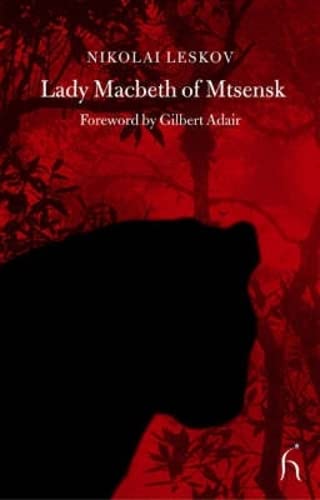Lady Macbeth of Mtsensk by Nikolai Leskov
Leskov illustrates the timeless truth of the Shakespearean archetype abruptly relocated to the Russian heartland in this potent and horrific short story. The youthful Katerina Lvovna wanders around the home yawning, longing for the carefree days of her childhood spent running around in her bare feet until she meets the feckless steward Sergei Filipych. She is chastened and constrained by her marriage of convenience to a man twice her age. Sergei proceeds to seduce Katerina, just like he has done with the majority of the women in the village, not thinking that once her desire is released, she will be so fervently attracted to him that she will stop at nothing to hold onto him. Journalist and prose author Nikolai Leskov is renowned for his strong narrative voice and distinctly Russian setting.
Lady Macbeth of Mtsensk by Nikolai Leskov
12 used from $4.28
It takes place in the rural centre of Russian provinces, an area Leskov was well acquainted with. Mtsensk is a town in the Oryol region, which lies south of Moscow and where he was raised. The funeral of an elderly man who had been killed by his sexy young daughter-in-law while he was hiding behind a blackcurrant bush on a summer day stuck in Leskov’s mind from his youth. This is what inspired Leskov to write his story.
Here, we transition from the aristocratic environment of a westernized St. Petersburg in the 1830s to the orient of rural Russian merchants in the 1860s. Leskov was one of the first authors in Russia to write about merchants, who at the time still belonged to a distinct social class. They kept their wives and business private, dressed differently, and tended to be conservative and pious. Therefore, it is not strange that Leskov’s young heroine takes a boyfriend since she is bored while her husband is gone.
In the manor house of her much older, merchant husband, Katerina Lvovna is a childless, bored housewife who is left alone all day long. The house is essentially a jail to Katerina with its gates, iron locks, and guard dogs. After living this fruitless life for five years, and with her husband frequently gone, she comes to the attention of a recently appointed young steward. Despite the fact that young Sergei is already known for being a womanizer and liar, Katerina voluntarily plunges herself into a turbulent love relationship. The inevitable happens, and Katerina and Sergei quickly find themselves in more difficult circumstances.
This early work by Leskov moves along quickly and reads as though it were being described by a seasoned peasant observer. Leskov’s later stories lack the several murders and ultimate self-destruction of his earlier works, but they do include his trademark interest in the common people of the area where he grew up, the Russian Orthodox Church and its practices, and the schismatic Old Believers. In Lady Macbeth of Mtsensk, this aspect isn’t as well-developed as it was in some of Leskov’s other works, but he still plays the game of making the simpler members of his tribe occasionally use the wrong term or makeup words, like romanticism.


 Amazon.com
Amazon.com 




